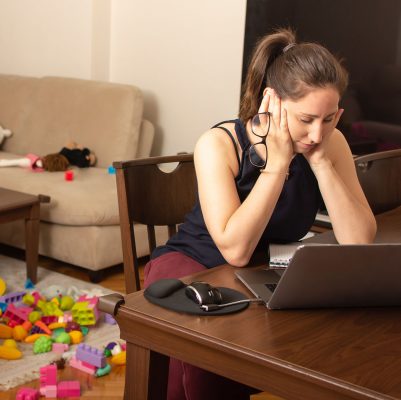Coping while working and learning from home


In September 2022 Xplornet became Xplore. Read more here.
Xplornet | June 3, 2021
There should only be a couple more weeks of the third wave of COVID-19 and hopefully, those of us in affected provinces are in our last lockdown. Fingers crossed!
In their article entitled, A Look at the Unhealthy Toll COVID-19 Has Taken on Mothers, the Welland Tribune references a survey conducted by Leger that suggests the pandemic is having a profound impact on the mental health of parents.
We’ve seen this firsthand at Xplornet where it’s not uncommon for our employee’s children to join a meeting! Even our top executives have paused a meeting to answer their child’s homeschooling question or take care of their other needs.
These responsibilities in addition to helping their children stay motivated and find the right words to express their distress – about not being able to see friends, or complete their assignments – are now part of a parent’s day-to-day life.
In their article, Third wave of COVID-19 pandemic ‘becoming unbearable’ for mothers struggling to cope, the CBC references a CAMH survey that said, “parents with children under the age of 18 living at home were more likely to report feeling depressed than adults without children.”
Having a strong arsenal of coping tools has never been more important.
Here are eight tips for coping through what’s hopefully the end of the final lockdown:
TIP 1: Create a schedule
On their Mental Health Tips page, the Government of Canada says that routine is great for families working and learning from home because it helps us be prepared for the day.
Create a routine that mimics the way we might have structured our day when we worked out of our homes. Here is an example:
- Shower
- Get dressed
- Eat breakfast
- Set up a dedicated workspace so that there’s a section of your house that you can associate with your work life.
- Keep regular working hours, scheduling time for breaks, and other self-care practices like stretching.
- Work/life balance is important. When the workday is over, leave your designated workstation and sign off.
Don’t worry if you feel less motivated during the workday than usual. It is normal for motivation to be low during times like these. Sometimes, taking a small step can be all you need to spark motivation. If the dishes are piling and you can’t seem to get the motivation to do them, try doing one dish. Similarly, if you can’t get the motivation to go for a run, try putting on your running shoes and see how you feel.
TIP 2: Connect with friends, loved ones, and colleagues virtually
This past year we have been instructed to only associate with one other household. This means there are many friends, family members, and colleagues we haven’t been able to see. Keeping in touch virtually can help:
- Connect with your colleagues by phone or video chat, not just to discuss work but to check in and see how each other are doing.
- Plan a phone call or video chat with friends or family members. Xplornet Digital Communications Specialist, Autumn Ladouceur says she likes to take a walk outside while chatting on the phone with a friend. “Sometimes when I’m outside enjoying nature and catching up with a friend it almost feels like we’re walking together,” she said.
TIP 3: Prioritize self-care
Self-care is important for our mental health and the mental health of those around us. In their article, Caring for children in the COVID-19 crisis, CAMH says that self-care is not only good for you, but your children will benefit from any sense of calm you can cultivate.
In their Mental Health Tips sheet, the Canadian Government recommends these self-care coping techniques:
- Get lots of sleep! 7.5 to 9 hours is ideal.
- Eat well and hydrate. Lots of fruits and vegetables and water will help you feel your best.
- Get exercise when you can. Even a short walk outside will make a difference.
- In their article, the CBC references the advice of mental health expert, Jeboah Miranda, who suggests “deep belly breathing” to help bring down the heart rate and alleviate stress and anxiety.
TIP 4: Spruce up your workspace
In their article Working from home solutions to the challenges of an abrupt workspace change, the Red Cross says adding a plant to your workstation will not only give you something nice and cheerful to look at but you will also benefit from a little slice of nature.
TIP 5: Take advantage of the perks of working from home
Working from home isn’t all bad! If you worked in an office, you know that the flashiest option for your 15-minute break was to take a walk outside, or at lunch to pick up some takeout.
The Red Cross reminds us that we can now use our coffee breaks to get ahead on at-home tasks like laundry or dishes. You can even get in a little workout or a stretch!
Now, you don’t have to gobble down a cold-packed lunch, but you can whip yourself up something hot and delicious. Take your time and enjoy each bite. Mindful Eating is another way you can claim some calm during a stressful workday.
All the time you used to spend commuting you can now spend on self-care! For more coping tips like these, read the Red Cross article here.
TIP 6: Set tech boundaries
It’s hard not to be constantly checking the news to see the number of new COVID-19 cases, or when the vaccine might be available to you and your family but being constantly plugged in might actually be draining your batteries. Here are some tips for setting tech boundaries:
- Use reputable websites ONLY. In their article, CAMH reminds us to make sure we are reading facts and only relying on credible sources like government and official healthcare websites.
- Choose a set time frame where you’re going to unplug. Perhaps the first hour after you wake up, and the hour before you go to bed.
- Use the “do not disturb” function on your smartphone and computer to ensure you don’t receive any notifications that could interrupt your goal.
TIP 7: Try the “Mind Shift” App
This free app was designed by Anxiety Canada for coping with anxiety. It uses the scientifically proven strategies behind Cognitive Behavioural Therapy (CBT) to promote relaxation, mindfulness and thinking patterns that lessen anxiety.
Learn more here.
TIP 8: Recognize when to seek help
In their article, Coping with crisis, the Red Cross says if your stress reaction persists and makes it impossible to function normally, it’s time to seek up. They list several resources including calling a Crisis Service Canada crisis support line.
Thank you to all the essential and front-line workers for their bravery. This has been an extremely challenging time for everyone, but there is a light at the end of the tunnel.
We are in this together. If you need fast rural Internet, you can check out the Internet Packages available here.


